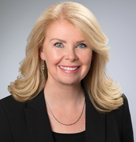Physician Thriving: New Year, New Decade, New Awareness?
By Hilary McClafferty, MD, FAAP
A disconnect between the importance of providing service to patients over the holidays and the ‘business of medicine’ struck home for some of us last month. For me it occurred with a series of computer-generated emails related to charting deficiencies and delinquencies and end of year metrics for a variety of measurable aspects of practice.
I feel fortunate that I can generally maintain perspective about electronic health records and practice metrics, understand their purpose and value, and stay focused on the deep satisfaction I get from my work. I wonder though about those who, perhaps unconsciously, combine an overdeveloped sense of self-sacrifice with a negative perception of metrics and peer comparison, leaving them with the perception of working harder and harder yet never succeeding in the ‘race’. I’ve heard from colleagues around the country that the gathering and sharing of practice metrics is in part designed to motivate us by leveraging the physician’s natural competitive instincts. But if internalized in a negative manner, comparisons have potential to take a heavy toll over time.
My experience with the emails reminded me that perhaps two of the most important aspects of self-care in modern medicine are self-awareness and attitude. Deliberate setting of healthy boundaries and maintenance of a realistic, yet optimistic perspective is critical to resilience and sustainable practice. This approach conflicts with the archetype of the long-suffering doctor many of us were shaped by, but they are necessary characteristics and applicable to a wide range of challenges physicians face. The structure and practice of medicine has certainly changed, our adaptation is required.
I hope you had some time off to recharge recently. And I hope you can block some time in the next few weeks or months to explore and enhance your sense of self-awareness and perspective. How do you think you are doing? Are you struggling to adapt in the ever changing, metric-driven landscape of medicine or have you remained nimble? Did you unconsciously slip back into unhelpful habits and attitudes? Are your boundaries holding, or do you need to correct slippage in areas important to your health? What course corrections are needed? Which new skills will help you thrive in the new year? I hope you are able to dial in and prioritize wellbeing. You have an unlimited capacity for change and growth. Combined with self-awareness and a dose of realistic optimism, you will be unstoppable.
 Hilary McClafferty, MD, FAAP, is board certified in pediatrics, pediatric emergency medicine, and integrative medicine. She writes and speaks nationally on physician wellbeing, resiliency, and whole physician wellness. She is a member of the International Coach Federation, certified physician coach, certified in Positive Psychology and Well-Being Coaching, and author of two books: Mind-Body Medicine in Clinical Practice and Integrative Pediatrics: Art, Science, and Clinical Application, and editor of three Special Editions on the use of integrative medicine in practice. She is Founding Director of the Pediatric Integrative Medicine in Residency program, University of Arizona, and Medical Director, Pediatric Emergency Medicine at Tucson Medical Center, Tucson, AZ. Email: mcclaffertyh@gmail.com Website: www.drmcclafferty.com Twitter: @drmcclafferty
Hilary McClafferty, MD, FAAP, is board certified in pediatrics, pediatric emergency medicine, and integrative medicine. She writes and speaks nationally on physician wellbeing, resiliency, and whole physician wellness. She is a member of the International Coach Federation, certified physician coach, certified in Positive Psychology and Well-Being Coaching, and author of two books: Mind-Body Medicine in Clinical Practice and Integrative Pediatrics: Art, Science, and Clinical Application, and editor of three Special Editions on the use of integrative medicine in practice. She is Founding Director of the Pediatric Integrative Medicine in Residency program, University of Arizona, and Medical Director, Pediatric Emergency Medicine at Tucson Medical Center, Tucson, AZ. Email: mcclaffertyh@gmail.com Website: www.drmcclafferty.com Twitter: @drmcclafferty






